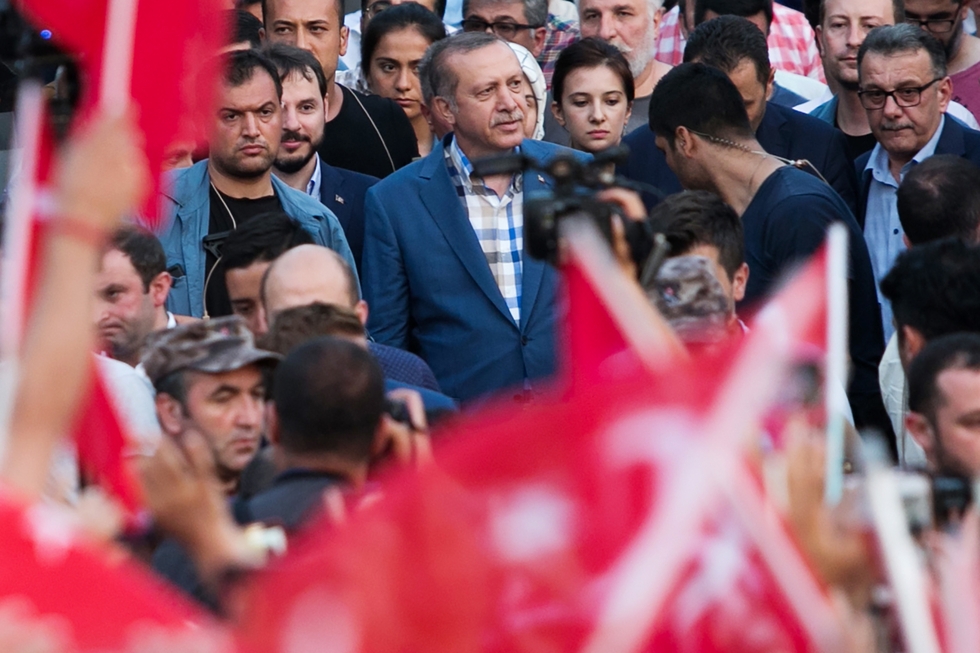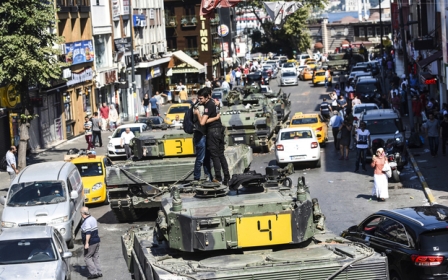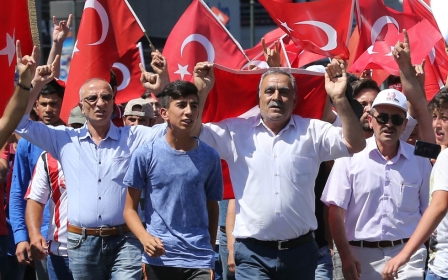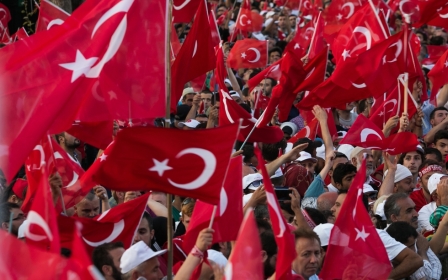Turkey's Erdogan leads post-coup crackdown amid clashes at air base

Turkey's ongoing crackdown after an attempted coup by a faction within the country's military has seen more than 6,000 people detained as the impact of the plot begins to be felt by the international community.
"Now the clean-up operations are continuing. We have around 6,000 people detained. The number will increase above 6,000," Justice Minister Bekir Bozdag said on Sunday, according to the state-run Anadolu Agency.
The crackdown has included at least 3,000 soldiers being arrested and 2,700 judges sacked.
Clashes broke out on Sunday between security forces and putschists at a Turkish air base in the central city of Konya, a Turkish official told AFP.
"We are able to confirm that there are clashes at the air base in Konya between the security forces and putschists resisting arrest," the source said.
The state-run news agency Anadolu later reported the fighting had come to an end and said six military personnel were arrested.
The official also confirmed an incident at Istanbul's Sabiha Gokcen airport, where police fired warning shots at putschists who were resisting arrest. They eventually surrendered.
At least 265 people were killed in clashes as the coup failed, with just over one hundred of them coup plotters according to the government. At least 1,400 people were wounded in the events over Friday night and Saturday morning.
Turkish President Recep Tayyip Erdogan has said parliament might consider a proposal to bring back the death penalty, according to the BBC.
Ankara is still seeking the extradition of eight military officers who fled to Greece seeking political asylum as the coup began to falter.
Coup vs coup
Egypt blocked a United Nations Security Council statement on Saturday condemning the attempted coup in Turkey that called on all sides to "respect the democratically elected government of Turkey," diplomats said.
Amr Aboulatta, Egypt's ambassador to the UN, told Reuters: "We proposed different language that respects democratic and constitutional principles, but the Americans refused to engage."
Statements by the 15-member Security Council must be agreed by consensus.
Diplomatic sources said Egypt believed the council was "in no position to qualify, or label that government - or any other government for that matter - as democratically elected or not".
Egypt’s current president is Abdel Fattah al-Sisi, an army general who came to power following a military coup in 2013 against Egypt’s first democratically elected president, Mohammed Morsi, who hailed from the Muslim Brotherhood.
Turkey’s ruling and socially conservative Justice and Development Party (AKP) supported the Muslim Brotherhood in Egypt.
Egypt proposed changing "respect the democratically elected government of Turkey" to "respect the democratic and constitutional principles and the rule of law," but the US and others on the UNSC were unconvinced, and negotiations on the text swiftly ended afterwards, according to diplomat.
The Egyptian foreign ministry said that it was "surprised that its proposed amendment was not taken up, and with the claim that it is obstructing the release of the statement".
Turkey between US and Russia
Turkish Labour Minister Suleyman Soylu accused the US on Saturday of being behind the attempted coup.
"The US is behind the coup attempt. A few journals that are published there [in the US] have been conducting activities for several months. For many months we have sent requests to the US concerning Fethullah Gulen. The US must extradite him," he said, referring to the US-based Turkish rival of President Erdogan.
Turkish cleric Gulen has been regularly accused of being behind claimed plots against President Erdogan.
US Secretary of State John Kerry, according to the BBC, told his Turkish counterpart by phone: "Public insinuations or claims about any role by the US in the failed coup attempt are utterly false and harmful to our bilateral relations."
US President Barack Obama called for all parties in Turkey to "act within the rule of law".
In the ever-changing quagmires of Turkish and Middle Eastern politics, Russia and Turkey – close to the brink of war only a few months ago – are continuing to strengthen their relations.
A Turkish official confirmed to MEE that President Erdogan and Russian President Vladimir Putin spoke on the phone. Putin expressed his backing for Erdogan and Turkey's elected government, and the two also agreed to meet in the first week of August.
Tug-of-war over Gulen
Deteriorating US-Turkey relations were not helped by Obama’s slow statement in support of the Turkish government, which was issued only after it became clear the coup was going to fail.
Ankara's desire to have Gulen extradited from his US home is another bone of contention between the two countries.
Erdogan on Saturday urged the US to extradite Gulen, whom he has accused of masterminding the failed coup, to face trial in Turkey.
"The United States - you must extradite that person," he told thousands of supporters in Istanbul, referring to Gulen, who lives in Pennsylvania and has denied any involvement in Friday's attempted coup.
Gulen, who has lived in self-imposed exile in the US for more than a decade, maintains a following within Turkey, and his supporters are believed to have raised some $17m between 2004 and 2015, the Voice of America (VOA) reported.
He has denied involvement in the coup, and his followers say they are victims of an unfair crackdown and have accused Erdogan of increasingly authoritarian measures.
Turkey's government accuses the Gulen movement of infiltrating the police, judiciary and political system and creating a state within a state.
Erdogan said he had repeatedly told President Obama that Gulen threatened Turkey's security and should be extradited.
“I say if we are strategic partners then you should bring about our request,” Erdogan said.
Secretary of State Kerry said on Saturday that the US will assist Turkey in the investigation of the failed coup and invited Ankara to share any evidence it has against Gulen.
"We fully anticipate that there will be questions raised about Mr Gulen," Kerry said in Luxembourg.
Shortly after the coup attempt began, Gulen condemned the military uprising "in the strongest terms".
"As someone who suffered under multiple military coups during the past five decades, it is especially insulting to be accused of having any link to such an attempt," he told reporters in a rare interview on Saturday.
The controversial preacher has also suggested that Erdogan himself organised a fake coup to further strengthen his powers.
“I don’t believe that the world believes the accusations made by President Erdogan,” Gulen said. “There is a possibility that it could be a staged coup and it could be meant for further accusations [against Gülen and his followers].”
This article is available in French on Middle East Eye French edition.
New MEE newsletter: Jerusalem Dispatch
Sign up to get the latest insights and analysis on Israel-Palestine, alongside Turkey Unpacked and other MEE newsletters
Middle East Eye delivers independent and unrivalled coverage and analysis of the Middle East, North Africa and beyond. To learn more about republishing this content and the associated fees, please fill out this form. More about MEE can be found here.




